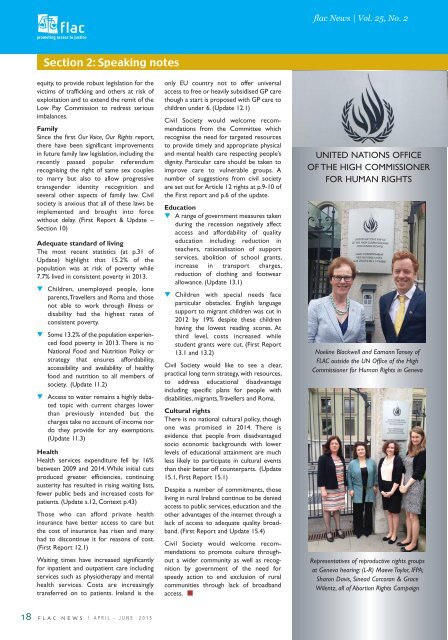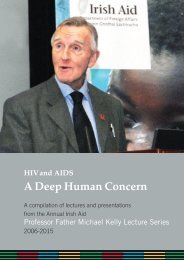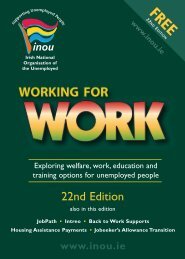FLAC News Summer 2015
You also want an ePaper? Increase the reach of your titles
YUMPU automatically turns print PDFs into web optimized ePapers that Google loves.
flac <strong>News</strong> | Vol. 25, No. 2<br />
Section 2: Speaking notes<br />
equity, to provide robust legislation for the<br />
victims of trafficking and others at risk of<br />
exploitation and to extend the remit of the<br />
Low Pay Commission to redress serious<br />
imbalances.<br />
Family<br />
Since the first Our Voice, Our Rights report,<br />
there have been significant improvements<br />
in future family law legislation, including the<br />
recently passed popular referendum<br />
recognising the right of same sex couples<br />
to marry but also to allow progressive<br />
transgender identity recognition and<br />
several other aspects of family law. Civil<br />
society is anxious that all of these laws be<br />
implemented and brought into force<br />
without delay. (First Report & Update –<br />
Section 10)<br />
Adequate standard of living<br />
The most recent statistics (at p.31 of<br />
Update) highlight that 15.2% of the<br />
population was at risk of poverty while<br />
7.7% lived in consistent poverty in 2013.<br />
t Children, unemployed people, lone<br />
parents, Travellers and Roma and those<br />
not able to work through illness or<br />
disability had the highest rates of<br />
consistent poverty.<br />
t Some 13.2% of the population experien -<br />
ced food poverty in 2013. There is no<br />
National Food and Nutrition Policy or<br />
strategy that ensures affordability,<br />
accessibility and availability of healthy<br />
food and nutrition to all members of<br />
society. (Update 11.2)<br />
t Access to water remains a highly deba -<br />
ted topic with current charges lower<br />
than previously intended but the<br />
charges take no account of income nor<br />
do they provide for any exemptions.<br />
(Update 11.3)<br />
Health<br />
Health services expenditure fell by 16%<br />
between 2009 and 2014. While initial cuts<br />
produced greater efficiencies, continuing<br />
austerity has resulted in rising waiting lists,<br />
fewer public beds and increased costs for<br />
patients. (Update s.12, Context p.43)<br />
Those who can afford private health<br />
insurance have better access to care but<br />
the cost of insurance has risen and many<br />
had to discontinue it for reasons of cost.<br />
(First Report 12.1)<br />
Waiting times have increased significantly<br />
for inpatient and outpatient care including<br />
services such as physiotherapy and mental<br />
health services. Costs are increasingly<br />
transferred on to patients. Ireland is the<br />
only EU country not to offer universal<br />
access to free or heavily subsidised GP care<br />
though a start is proposed with GP care to<br />
children under 6. (Update 12.1)<br />
Civil Society would welcome recom -<br />
mendations from the Committee which<br />
recognise the need for targeted resources<br />
to provide timely and appropriate physical<br />
and mental health care respecting people’s<br />
dignity. Particular care should be taken to<br />
improve care to vulnerable groups. A<br />
number of suggestions from civil society<br />
are set out for Article 12 rights at p.9-10 of<br />
the First report and p.6 of the update.<br />
Education<br />
t A range of government measures taken<br />
during the recession negatively affect<br />
access and affordability of quality<br />
education including: reduction in<br />
teachers, rationalisa tion of support<br />
services, abolition of school grants,<br />
increase in trans port charges,<br />
reduction of clothing and footwear<br />
allow ance. (Update 13.1)<br />
t Children with special needs face<br />
particular obstacles. English language<br />
support to migrant children was cut in<br />
2012 by 19% despite these children<br />
having the lowest reading scores. At<br />
third level, costs increased while<br />
student grants were cut. (First Report<br />
13.1 and 13.2)<br />
Civil Society would like to see a clear,<br />
practical long term strategy, with resources,<br />
to address educational disad vantage<br />
including specific plans for people with<br />
disabilities, migrants, Travellers and Roma.<br />
Cultural rights<br />
There is no national cultural policy, though<br />
one was promised in 2014. There is<br />
evidence that people from disadvantaged<br />
socio economic backgrounds with lower<br />
levels of educational attainment are much<br />
less likely to participate in cultural events<br />
than their better off counterparts. (Update<br />
15.1, First Report 15.1)<br />
Despite a number of commitments, those<br />
living in rural Ireland continue to be denied<br />
access to public services, education and the<br />
other advantages of the internet through a<br />
lack of access to adequate quality broad -<br />
band. (First Report and Update 15.4)<br />
Civil Society would welcome recom -<br />
mendations to promote culture through -<br />
out a wider community as well as recog -<br />
nition by government of the need for<br />
speedy action to end exclusion of rural<br />
communities through lack of broadband<br />
access. n<br />
UNITED NATIONS OFFICE<br />
OF THE HIGH COMMISSIONER<br />
FOR HUMAN RIGHTS<br />
Noeline Blackwell and Eamonn Tansey of<br />
<strong>FLAC</strong> outside the UN Office of the High<br />
Commissioner for Human Rights in Geneva<br />
Representatives of reproductive rights groups<br />
at Geneva hearing: (L-R) Maeve Taylor, IFPA;<br />
Sharon Davis, Sinead Corcoran & Grace<br />
Wilentz, all of Abortion Rights Campaign<br />
18 F L A C N E W S l A P R I L – J U N E 2 0 1 5





